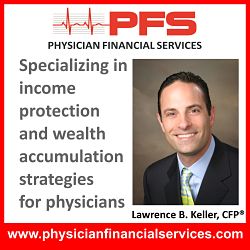This is a post about independent insurance broker Lawrence Keller, CFP®, CLU, ChFC, RHU, LUTCF. He is a sponsor of Wealthy Mom MD. 
Besides disability insurance, do you sell other insurances?
Yes, besides disability insurance, I also sell term life insurance.
Are there any particular insurances that you think us physicians should be aware of?
When purchasing term life insurance, as you discussed previously, carriers look many factors. These may include height, weight, blood pressure, pulse, personal medical history, and family history. Ideally, you want to apply to for your life insurance with a company in which you have the best chance of receiving the most favorable underwriting classification and, thus, the lowest premium rate.
For example, if one has an immediate family history of Coronary Artery Disease (in a parent prior to age 65), they should consider which company they apply to. For instance, a company may not care if the family member was diagnosed with CAD; instead, they focus on if the individual passed away as a result. If they are alive and the proposed insured meets all of the other criteria, they would typically still qualify for the best underwriting classification. The same is true for cancer. Some carriers will take this family history into consideration and others will not.
While I do not sell Property & Casualty Insurance, physicians, in most cases, should have more coverage here. Specifically, they should carry an Umbrella or “Excess Liability” policy – especially if they drive a car. This extends the liability limits of your automobile and/or homeowner's insurance policies. You would likely want to purchase all of these from the same insurance company. In doing so, you can have them integrated and coordinated with each other, as well as, qualify for discounts.
How do you differ from other brokers?
I'm an academic at heart and understand the nuances of each policy available in the marketplace. I also have access to discounts, in many cases, including unisex rates for females. However, unlike other brokers, I don't advertise this or use it as a way to bring me new clients. If I find myself in a situation where I know that the potential client needs a product or discount that is “exclusive” and I cannot provide it, I will refer them to the “endorsed” agent. I do this knowing that I will not be compensated.
You never have a second chance at a first impression. I have found that the “goodwill” that this provides has done more for me than any commissions that I could have earned selling a product that was not in the best interest of the potential client.
Do you have any advice on how to choose an independent insurance broker and what makes someone a good broker?
I think a “good broker” possesses certain qualities. A good broker:
- has a deep understanding of the marketplace,
- represents several companies,
- provides illustrations of coverage from each of them,
- and takes the time to thoroughly review the differences.
An independent insurance broker who does these things helps clients make a decision that best meets their individual needs, goals and budget.
Beware of agents that are “captive” and can only offer policies to you from one company or have a strong financial incentive in to do so. The client should never feel that they were “sold” something or pressured to make a buying decision. The client should feel that their broker was a resource throughout the process. They should feel that they had their best interest in mind and made the process as enjoyable and informative as it could be.
I would also look an independent insurance broker with credentials and/or certifications in the insurance and/or financial planning industry. This shows dedication to the industry and the desire to learn. More so, these brokers usually have a good understanding of the financial planning process, not just disability and life insurance policies.
Finally, you will not be paying more for purchasing your policy from an experienced insurance agent than you would from an inexperienced insurance agent.
What are the top 3 things you see that physicians don’t understand about disability insurance?
Understanding Premium Pricing
If policies are structured the same way and all agents are showing policies with the same discounts, the premium rate will be the same. This industry is heavily regulated and the premium rates and contractual language must be approved by each state. Therefore, if the plan parameters are the same, the only way that one agent can provide a lower price to the consumer is by having access to or knowing of a discount plan that another agent does not.
Association Plans v. Individual Policies
Association plans (not individual policies that include an association discount) are inferior compared to individual policies. Typically, the policy can be cancelled by the association or insurance company. Also, premium rates can increase every five years (generally when your age ends in a “0” or a “5”). Plus, the definition of total disability is not “Own-Occupation” and you don't receive a policy. You simply receive a certificate that evidences that you are part of a larger group.
Understanding LTD Plans
When it comes to group LTD plans and individual policies, there is no such thing as a “primary” or “secondary” company. If you meet the definition of total disability under both policies, you can potentially collect full benefits under both policies.
Additionally, with the exception of those eligible to purchase coverage under “New In Practice” limits, generally, if you are going to be eligible for group LTD coverage with a new employer, it must be taken into consideration when determining the amount of individual coverage available and deferring enrollment into a mandatory group LTD plan to potentially allow you to purchase a larger amount of individual coverage does not work. If you submit a copy of your employment contract in order to purchase coverage based upon your “new” salary and it mentions that you will be provided with Long-Term Disability insurance, the underwriter will ask about this and, again, it will be taken into consideration when determining the amount of individual coverage available for purchase.
Finally, it does not matter if the group plan's definition of total disability is “Own-Occupation” or not. Instead, the insurance company must assume that if you are disabled, you can potentially collect under the group LTD plan. After all, the insurance companies to not want to give you an incentive not to work. That would allow you to make more money not practicing than if you continued to practice medicine.
Is there anything else you would like to tell us as an independent insurance broker?
The time to ask your questions is when you are researching the policies available. You don't want to find out that you purchased the wrong policy and then start doing your homework.
All too often, I see physicians in this situation that could have easily been avoided if they took the time to really understand what they were purchasing. Unfortunately, they don't have the ability to make changes based upon medical or financial issues that arise subsequent to the purchase of the policy or policies they no longer feel to be adequate.
I hope you enjoyed learning a bit more about Lawrence and independent insurance brokers!

Get the bestselling book - Defining Wealth for Women.



